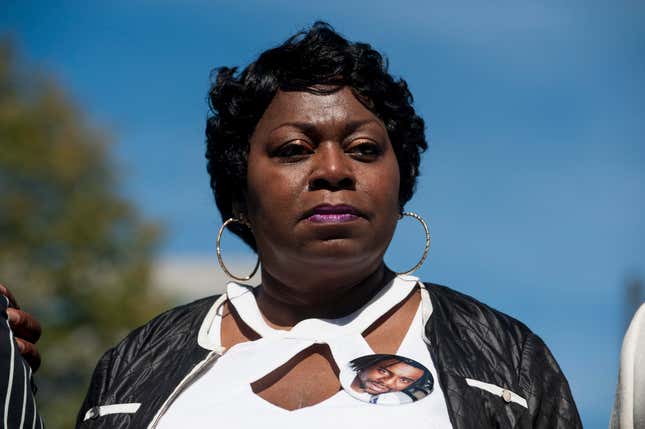
It’s just one of the ways Valerie Castile is upholding her son’s legacy.
Before Philando Castile, a beloved cafeteria supervisor in St. Paul, Minn., was shot and killed by a police officer during a routine traffic stop in July 2016, he was known for the care and generosity he demonstrated towards the kids he served.
According to teachers and staffers who worked alongside Castile at J.J. Hill Montessori School, he not only knew the names, food preferences and allergies of the students he fed, Castile would also pay for their school lunches with his own money if they couldn’t afford a meal that day.
Valerie Castile tapped into that same spirit last month, gifting Cooper High School in New Hope, Minn., $8,000 to clear the school’s unpaid lunch bills.
“This is something that Philando held near and dear to his heart,” Castile told a Minnesota news station.
“The kids shouldn’t have a debt hanging over their heads, and the parents shouldn’t either,” she said in another interview with NPR. “I just believe that the schools should furnish free meals for our children.”
The recent gift is part of an ongoing effort to feed school children in the St. Paul, Minn., school system through the Philando Feeds the Children charity. Founded in Castile’s honor, the organization has raised over $130,000 to pay off lunch debts as of last year.
But some education advocates say Castile’s spirit of providing meals to low-income students should extend beyond the charity that bears his name. In fact, that such crowdfunding campaigns are necessary is part of the problem.
The Huffington Post noted a recent controversy in Rhode Island, where one public school system limited students with lunch debt to eating sunflower butter and jelly sandwiches (after a backlash, the school system backtracked on that policy). In the Chicago Tribune, Castile’s gift inspired an op-ed calling for more school systems to follow the lead of Chicago and New York City schools, which have greatly expanded free lunch options for public school students.
A recent article from ThinkProgress underscored the somber reality that makes donations like the one Castile recently gave necessary: a political landscape that doesn’t value feeding low-income children.
On the one hand, there’s the clunkiness of the system, which often penalizes kids who rack up lunch debts “unwittingly or incorrectly due to paperwork or other miscommunications,” ThinkProgress writes:
In theory, every public school student whose family is getting by on less than 130 percent of the federal poverty line (FPL) is eligible to get school meals paid for entirely by federal tax dollars. In practice, many of those eligible students still end up getting charged–and, when they can’t pay, getting punished for their family’s poverty through policies that bar them from school events or otherwise make their full membership in their school community contingent on their financial status.
Free and reduced-price lunch and breakfast reimbursements add up to about $13 billion a year, according to U.S. Department of Agriculture (USDA) stats. But anyone who falls short of what schools charge for meals in the reduced- or full-price food categories has to come up with the money on their own; federal policy bars schools from using any of their reimbursement funds to wipe their slates clean.
But there’s also the matter of political will: crowdfunding campaigns to wipe away school lunch debt have become so widespread, in part, because school districts are unwilling or unable to meet the USDA requirements to extend free lunch programs. But the matter is also cultural. Measures like marking free lunch recipients with a distinct stamp or firing cafeteria workers for providing free meals to students unable to pay tap into a deep national obsession with shaming the poor by any means necessary.
The stakes for feeding our nation’s children are high: not only does hunger and malnutrition affect kids’ physical outcomes, but persistent hunger can create “toxic stress” in children, the American Psychological Association reports. This toxic stress impacts brain development, information processing and academic achievement in children. And children who live in food-insecure homes are more likely to have issues with anxiety and depressive disorders.
Philando Feeds the Children is the continuation of a legacy. But if we really value Castile’s life and how he lived it, feeding school children ought to be policy, no matter which school district you live in.

